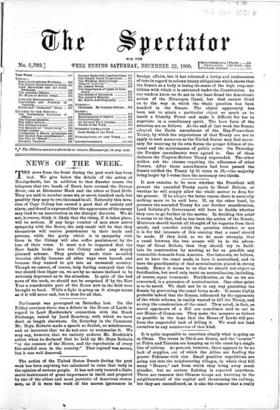It now remains to be seen whether the President will
present the amended Treaty again to Great Britain, or whether he will simply allow the whole matter to drop for the present. If he adopts the latter course there is naturally nothing more to be said here. If, on the other hand, he presents the amended Treaty for our further consideration, Lord Salisbury's Government will have to decide whether they care to go farther in the matter. In deciding this point it seems to us that, bad as has been the action of the Senate, Ministers should banish all thought of its vagaries from their minds, and consider solely the question whether or not it is for the interests of this country that a canal should be made. If they hold, as we do most strongly, that a canal between the two oceans will be to the advan- tage of Great Britain, then they should try to facili- tate its construction by meeting as far as possible any reasonable demands from America. Onr interests, we believe, are to have the canal made, to have it neutralised, and to have the guardianship of that neutralisation placed in strong hands. Hence it seems to us that we should not object to fortification, but need only insist on neutralisation, including, of course, equal treatment. Fortification, as far as we are concerned, is a guarantee of neutralisation. One other point is to be noted. We shall not be in any way punishing the Senate by preventing the canal being made. It seems highly probable indeed that the Senate, influenced by the opponent& of the whole scheme, in reality wanted to kill the Treaty, and so stop the construction of the canal. They acted, in fact, as secret opponents of a Bill are sometimes said to act in our House of Commons. They make the measure as violent as possible in the hope that the House of Lords will per. form the ungrateful task of killing it. We need not lend ourselves to any manceuvres of that kind.






































